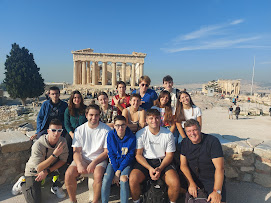
Dear Professor,
Usually I choose a book with the title or the image on the cover, but after the book has attracted my attention and my curiosity I always read the summary behind. I've been deceived by the cover many times. In fact, the book that had attracted me turned out to be a disappointment (though it wasn't what I expected). Similarly, books with a cover that didn't arouse curiosity in me turned out to be very interesting. Similar things happen with people, they are also books to choose and judge. How many times do we men stop only at the cover and title of the person, instead of "turning the book over" and reading the summary. It happened to me some time ago, to meet new people including two girls that at first I found unpleasant, a bit too vain and also with that air of superiority. In these months I shot those books and started to read the summary: I liked that book, the deepest part! Now I don't find them more unpleasant and even if they are not my best friends, they are good and kind to me. Judging a book by its cover is never a good idea, even if sometimes it is difficult to resist the temptation to buy and choose it without reading it. How can you resist this temptation? How do you judge a book?
Sofia, IA
Dear Sofia,
The Italian philosopher of the language Massimo Baldini, in a beautiful book entitled "Elogio del silenzio e della parola" (ed. Rubbettino) has described with effectiveness the contemporary reader. He states that in the twentieth century "the nomadic reader appeared, the poacher reader, the reader who proceeds by tasting, who no longer reads the texts in full, but by polling, jumping, appeared readers who cannibalized the texts, who proceeded between the pages of the works with the zigzagging gait of those who walk herbalizing". I have to say that "walking in herbalism" is the phrase I prefer, because it represents well the way of moving between books and authors. The image of the bovine is basically very familiar (I hope not only to me) and its zigzagging gait is very similar to our walking in search of beauty, traces to orient ourselves in the world and hypotheses of reading. So let's travel on this significant double track: book-human being, cover-appearance and reality. Unfortunately, books lie, omit and promise. Just like people. They lie when they ensure what they cannot keep: mediocre, pretentiously titled works that do not produce advances in culture or understanding. Sometimes they omit out of necessity. The name of the author was not written on Spinoza's "Theological-Political Treatise" published in Holland in 1670, but that omission served to protect the philosopher and guaranteed him the possibility of freely expressing his thought. Others still commit themselves without maintaining. Between 1886 and 1887 Nietzsche thought of writing a grandiose work entitled: "The Will of Power". He mentions it explicitly in bold in the words "Genealogy of morals" and even announces it on the cover of the book. But he will never write it or publish it in life. In literature it often happens that the title or cover has no relation to the content. It may seem strange to you, but books of literature are not wise, so the title is not necessarily linked to the plot, it can be a simple suggestion sought. Moreover, the sense given by the author is often different from what the reader attributes to him and many titles depend on commercial choices to optimize sales and not to clarify the content. But it is also right to make random choices, which are not so random, because a book that arrives at the bookstore and stays there for a long time is already a widely selected book. To put it bluntly, if one happens to find Stefano Benni on a shelf and is fascinated by his writing, it is true that he may have discovered the author because of a favourable economic situation, but the book was certainly not there by chance. It is probable that by some fatalities you can make such great acquaintances, and it is also nice to be amazed by the reading and recognize for yourself the beauty, the style and the plot of a masterpiece. Yes, because then you want to share that beauty with others. With experience, you become more astute in the choice of works, because everyone builds their own criteria for reading, the filters to rely on for the interpretation of events or for the style of the narrative. But the fascination of casual discovery, the enchantment of the moment, the pleasantness of the encounter, the openness to the newness that must manifest itself remain absolutely unique pleasures. Choosing a book, without the circumspect colored lenses of adults, is an act of trust, as when we are going to taste a new food. In any case, to be sure of being free, it is necessary to take Pennac's advice on board, that is, his suggestions formalized in the "ten rights of the reader" (Come un romanzo, Feltrinelli). The right not to read, to skip the pages, not to finish the book. Sometimes - for books as for people - in order not to fall into fatal mistakes, it can be very useful to rely on another essential right: the right to reread.
A warm greeting,
Alberto


























